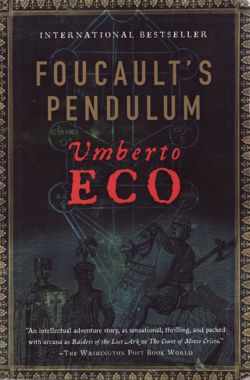So, keeping with what I started when I finished the previous book, I just looked up my “Kindle Ratio”… namely the percentage of the last 20 books I’ve read available on Kindle. I’ve said that as soon as this ratio reaches 50%, I want a Kindle. Well, it stays steady at 35%… 7 of the last 20 books. So we’re still not quite there unfortunately.
|
(As translated from the Italian to English by William Weaver that is.) This is the kind of book that has a reputation as being the kind a lot of people start, but most don’t finish, because it is difficult and inscrutable. So of course I wanted to try it out. Reading the first chapter, I firmly believe that it is intentionally constructed in such a way as to put off readers, and encourage all but the most dedicated to stop there. Not that there is anything particularly DIFFICULT about the reading, it is just a guy having very scattered seemingly random thoughts while wandering through a museum… with all sorts of references to all sorts of things that a reader may or may not get. It is rather annoying. But the book does settle down a bit after that and starts to read (mostly) like a regular narrative, although it does use that very annoying method of regularly moving backward and forward in time, with the vast majority of the book being flashbacks from the guy in the museum remembering what has happened that led him to the museum at that time. Annoying. I hate that device when it is used in TV and Movies, and I don’t really like it any more in writing. Over the course of the novel, the main characters delve into the creation of a huge conspiracy theory involving many of the usual suspects in conspiracy theories. They are making it all up, but as often happens in such things, it takes on a life of its own and trouble ensues. Some of the conspiracy and historical stuff is actually quite interesting. I found myself on more than a few occasions taking a detour to Wikipedia to look up people, places and organizations that were mentioned to investigate a bit about the real world versions as opposed to what was being depicted. And that was fun. But a big part of this was a very transparent look at words versus reality, and questions relating to objective reality versus perceived reality, and if saying something and believing it enough makes it true… or close enough to true that it doesn’t matter…. if there is even a such thing as “true” outside of the perceptions of those looking at and talking about things. Blah, blah, blah, blah. Look, I like those sorts of philosophical conundrums. But it was a bit of a stretch to make it 623 pages long. The value in this book is in the thinking about the concepts being raised and in the interesting historical bits. In those ways it is interesting. There is fun stuff there for those who are intellectually curious about various aspects of European history, or of philosophical questions about the interrelationships between knowledge, language, perception and reality. Or, to be specific, semiotics, which Eco is a professor of. If you like exploring those kinds of concepts, you will like this. But as a flat out novel with an interesting story for the purpose of entertainment… not as much. So I guess it depends what you are into. I did like it for the intellectual stuff, but it would have been nice if the story part was a bit more compelling. Am I glad I finally got around to reading it? Yes. I’d wanted to read this for awhile, and now was the time I guess. Many years ago I read The Name of the Rose, also by Eco, and I must say I liked it better. It has many of the same types of themes and intellectual side trips, but I think the Medieval setting just worked better and the actual story was better… So if you want to read an Umberto Eco book, I’d go with The Name of the Rose first. |
||
